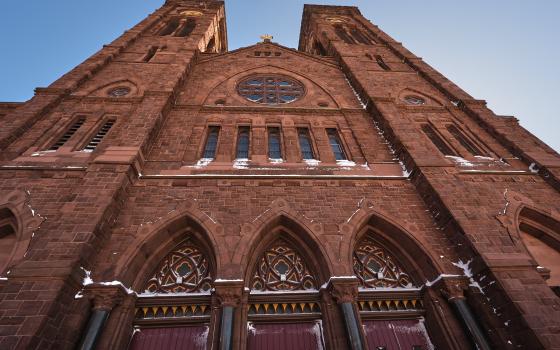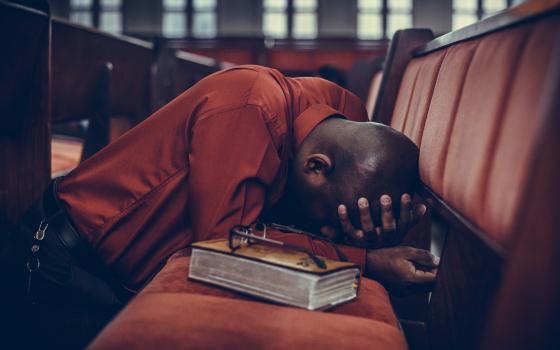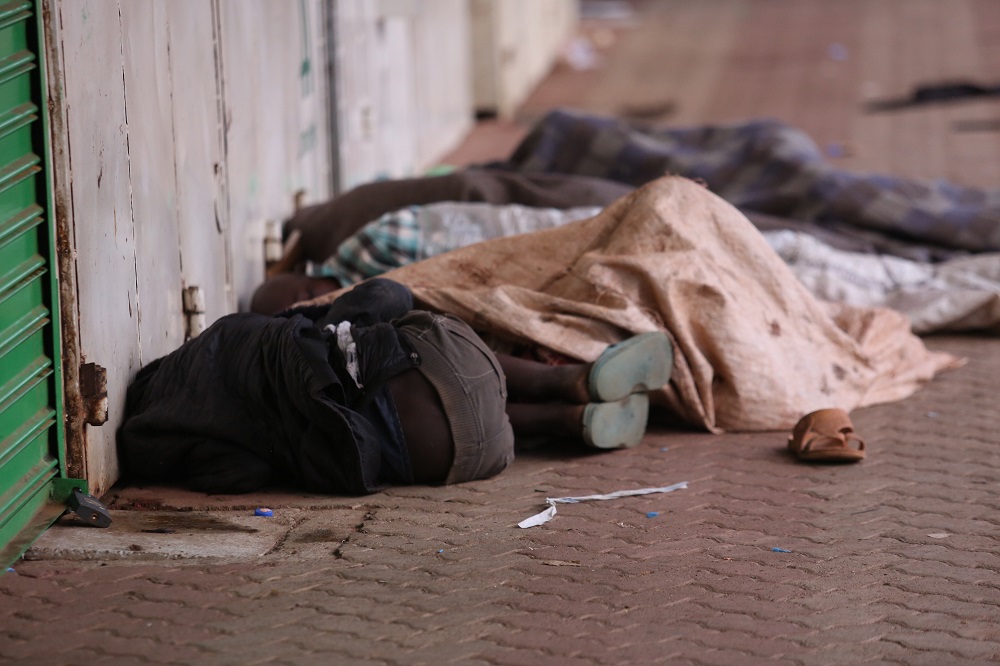
Homeless children sleep, huddling close to increase warmth, on the streets of Nairobi, Kenya. They will take turns staying awake to fend off the dangers that often appear in the darkness. (GSR file photo)
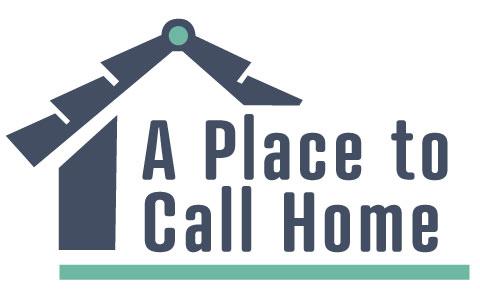
(GSR logo / Toni-Ann Ortiz)
In February, months before the coronavirus had infected more than 10 million people globally, Global Sisters Report launched an ambitious series, A Place to Call Home, that focused on Catholic sisters from multiple congregations and countries helping those who are homeless or lack adequate shelter.
As the pandemic began to escalate, we talked about stopping the series. Instead, we moved forward in a world that suddenly looked different. We asked our writers to check in with the sisters in their stories to discuss how COVID-19 fears and restrictions affected their projects.
Now, at the series' midpoint, GSR has written about how inadequate housing affects teens and young adults, families, migrants, the elderly, and those displaced by natural disasters and climate change. We have talked to or heard from sisters in Kenya, India, Vietnam, Puerto Rico, the Philippines and the United States.
This week, GSR is showcasing a few of the pieces from A Place to Call Home ahead of a new story, which will be published Thursday, July 9. These and all of the pieces are worth revisiting — or enjoying for the first time if you missed them.
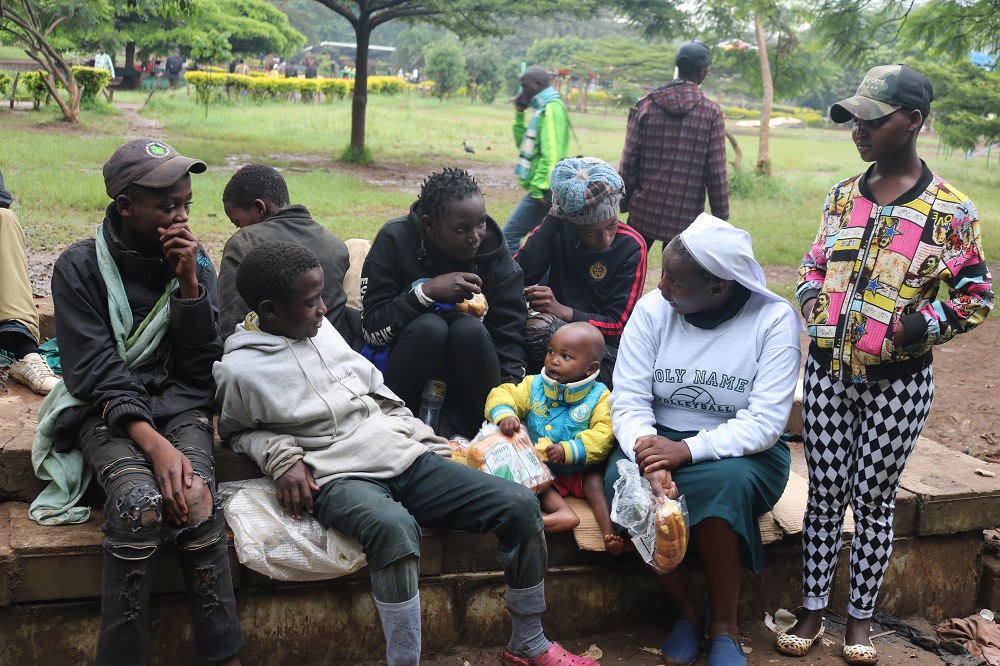
Sr. Caroline Ngatia shares a light moment with homeless boys on the streets of Nairobi, Kenya. (GSR file photo)
Demolition, family strife push boys to the streets of Nairobi by Doreen Ajiambo, published March 9
Tens of thousands of children are living on the streets of Nairobi — some forced out by poverty, violent home lives and family breakups. Assumption of the Blessed Virgin Mary Sr. Caroline Ngatia walks the streets daily and provides meals, shelter and education for boys ages 8 to 14 at Kwetu Home of Peace.
"I always feel like crying whenever I see a child sleeping in the cold and without a meal," said Ngatia, who broke down in tears while talking to reporter Doreen Ajiambo. Some of the children on the street comforted her. "It is disheartening to see these children suffering."
The goal of Kwetu Home of Peace is to reform and rehabilitate the boys through counseling, games, drama and useful life skills, such as house cleaning, agriculture and carpentry.
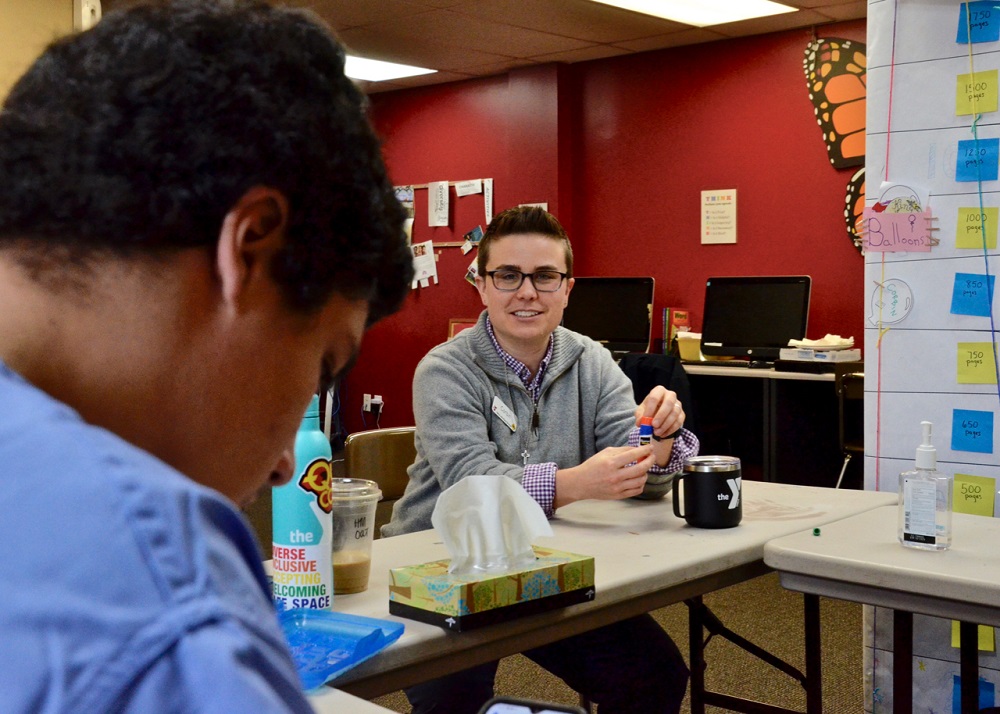
Troy (not his real name), left, is a client at YMCA Safe Place Services in Louisville, Kentucky, where Providence Sr. Corbin Hannah, right, is youth development coordinator. (GSR file photo)
Nowhere to go: Young people cope with homelessness in the US by Dan Stockman, published April 6
On any given night in the United States, 41,000 unaccompanied youth ages 13 to 25 are without a home. And on all of those nights, Catholic women religious are working to shelter them, feed them, and protect them.
Every situation is unique, but more importantly, every situation is complex. And the complexity grows when young people are on the street.
"They don't trust people. They get kicked out of places because of their behavior," said Providence Sr. Corbin Hannah, youth development director of YMCA Safe Place Services in Louisville, Kentucky. "They don't have their birth certificates or Social Security numbers or identification, all of which they need to get a job. They don't have transportation or a place to shower or wash their clothes. If they have any valuables at all, they have nowhere to keep them."
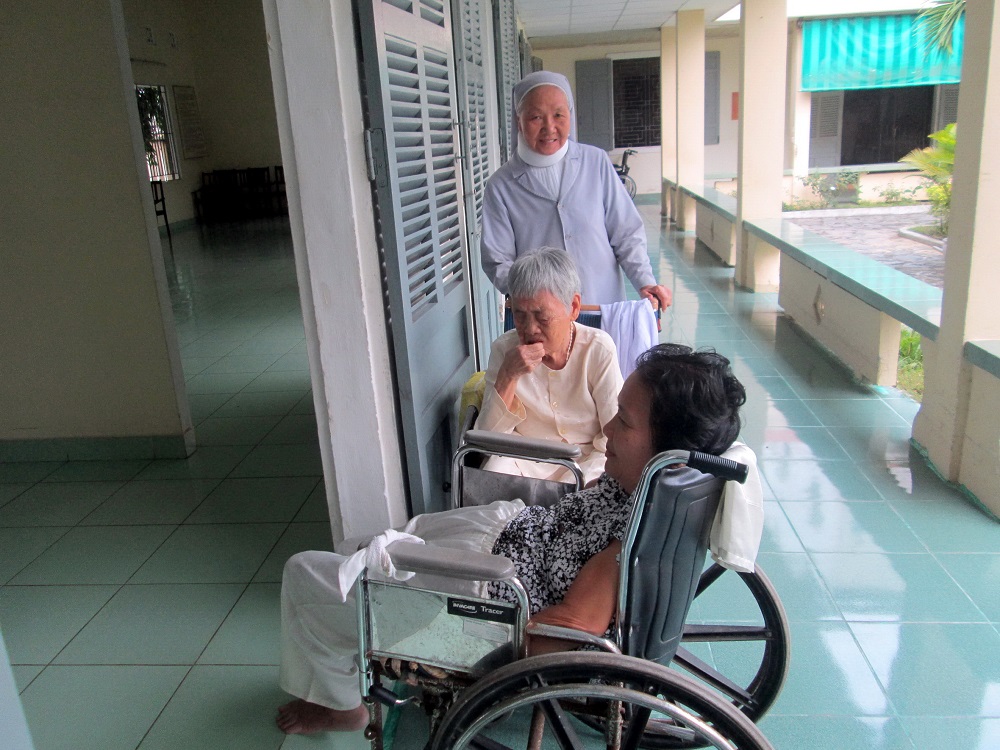
St. Paul de Chartres Sister Léonard Huynh Thi An, head of the Elderly Loving Home in Da Nang, Vietnam, talks with two elderly women who became homeless after their children abandoned them. (GSR file photo)
In Vietnam's aging society, homeless women find shelter with nuns by Joachim Pham, published June 1
In Vietnam, cultural change is leaving more elderly people living in poverty on the streets.
St. Paul de Chartres Sr. Léonard Huynh Thi An, who works with elderly homeless people in Da Nang, said more and more of them are abandoned by their relatives. Family circumstances and crises, including breakdowns in relationships, domestic violence, abandonment and rifts over inheritance are major causes of homelessness.
An, who runs the Elderly Loving Home in Da Nang, said local authorities send all homeless people and vagrants to government-run centers, which are very crowded. They have no housing options.
"[Elderly Loving Home] is my home and they [nuns and volunteers] are my real relatives because my own relatives have abandoned me," one 81-year-old woman told reporter Joachim Pham.
Advertisement
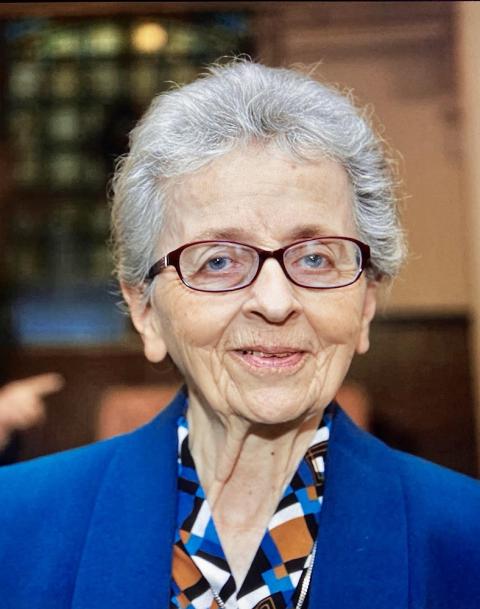
Sr. Susanne Lachapelle of the Little Sisters of the Assumption (Provided photo)
Ordinary becomes extraordinary! by Sr. Susanne Lachapelle, published April 2
One day in Advent 2019, as Sr. Susanne Lachapelle stepped off the elevator at LSA Family Health Service in New York City, a co-worker called to her for help. A man had arrived at the center, crying, soaking wet and freezing.
The man, originally from the Midwest, had been living on the street. As Sister Susanne spoke to the man, she learned he was a former Marine who had served in Afghanistan for four years. A call to the Department of Veterans Affairs led to an offer of help, but not of an immediate place to stay. Eventually, the man decided to leave, carrying Sister Susanne's contact information and other information from the VA counselor.
"When I saw the condition he was in and heard some of his history, I was overcome with gratitude that we could take part in helping him," Sister Susanne wrote in her column. "He bears the wounds of having fought for freedom. This experience confirms my conviction that war is never the solution to problems."
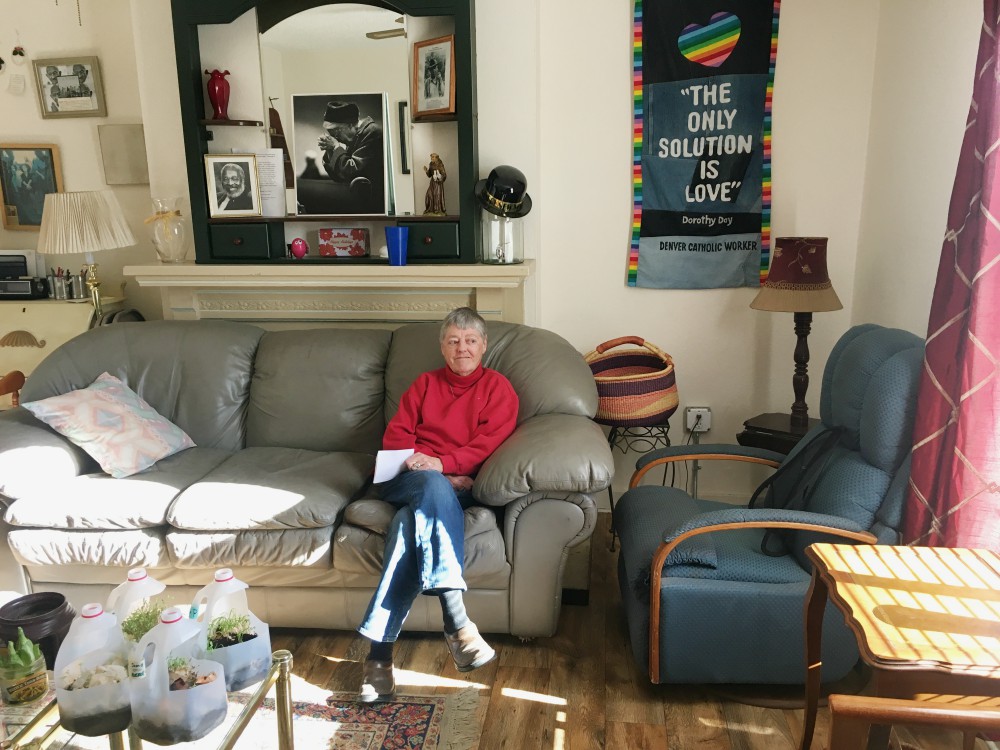
Loretto Sr. Anna Koop in the Denver Catholic Worker House (Georgia Perry)
Q & A with Sr. Anna Koop, a Catholic Worker ministering to Denver's homeless by Georgia Perry, published April 21
Loretto Sr. Anna Koop is a Denver-based housing activist who opened the Denver Catholic Worker House in 1978. In the last 40 years, she has witnessed an increase in homelessness and a decrease in available housing in Denver.
"In the '80s, we were renting an apartment for $150 [per month]. Between that and now — over $1,000 for a one-bedroom," she said. "Huge difference. I mean, it's just outpriced a strata of our population."
In her interview with GSR, she also talked about housing as a basic human right and how it has become a profit-driven business. "Things shouldn't be done in the ever-popular old capitalist ways: If you build housing, you should be able to make a lot of money. You have to get your money back. Not only that, you have to profit."
When we developed A Place to Call Home, we knew our series would not be able to fully encompass sisters' work internationally. We wanted to include the efforts of as many sisters as possible who are addressing homelessness and/or affordable housing issues. So we created a questionnaire so you could tell us how you, your community, or sisters you know are giving others a place to call home.
We received more than 80 responses as of June 30, which we used to create this interactive map showcasing sisters' work. And we're not done yet; if you would like to add to our map, please fill out our questionnaire here.




